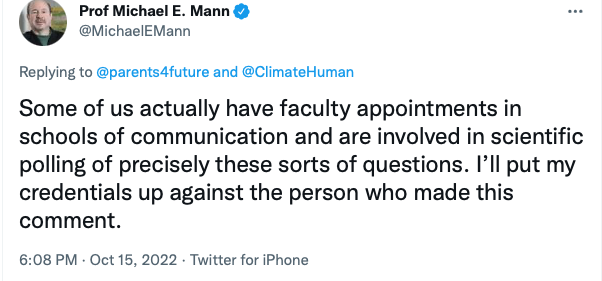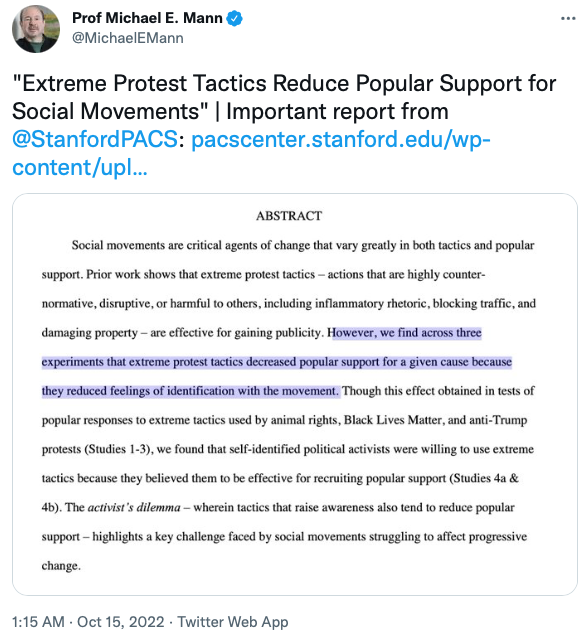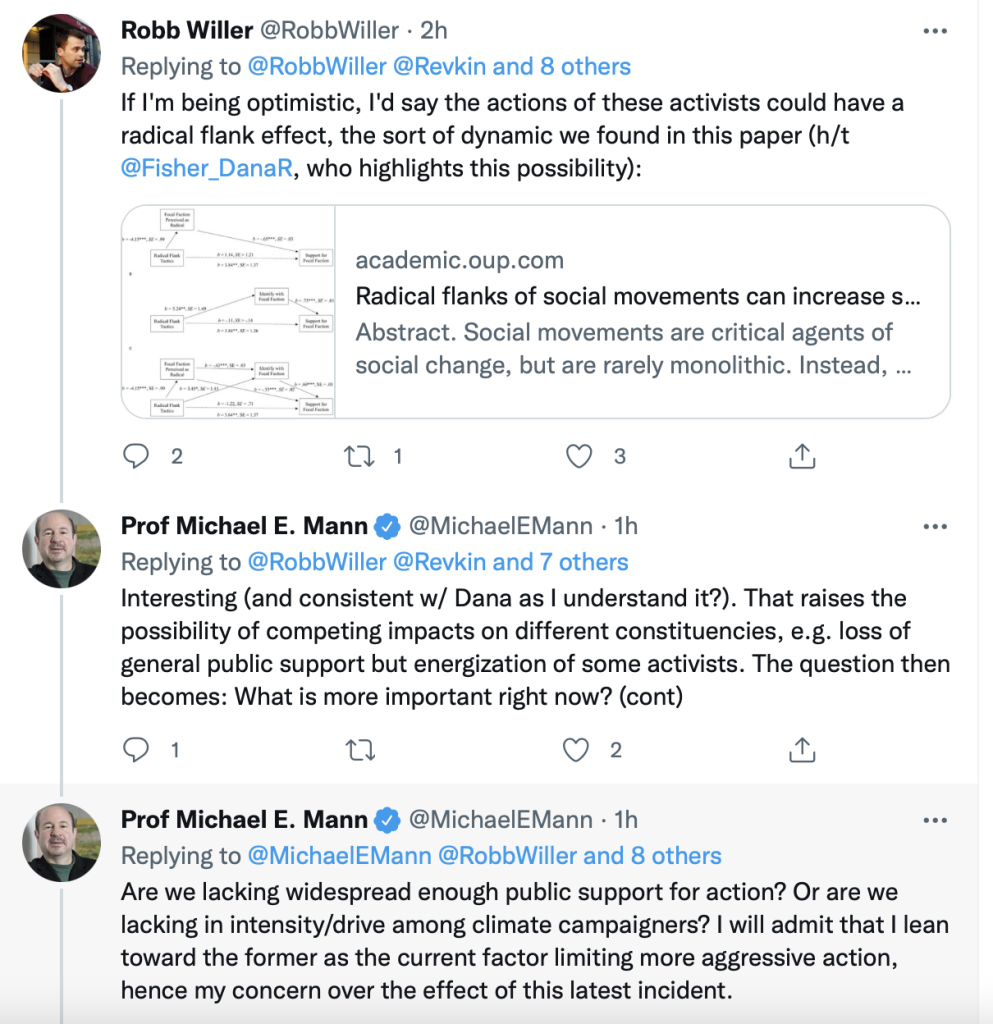Van Gogh was 35 when he painted the Sunflowers, which is currently residing in The National Gallery, London (the gallery bought the painting in 1987 for $40m). If you earn twice the average UK salary (approx £30k), it would take you one thousand three hundred and thirty three years to save up enough money to purchase it, assuming of course that you don’t spend any of your earnings on anything else, the painting doesn’t appreciate in value, and the planet is still habitable in the year 3355. The painting, of which there are various versions, is protected by glass. So if anyone was foolish enough to, oh I don’t know, throw something at it, soup maybe, it would not damage the painting one iota. Whilst representative of one period in his life, Van Gogh was quite a prolific artist, creating more than 2000 works of art, 900 of which were oil paintings. If he were alive today, and presented with the spectacle of a couple of Just Stop Oil activists hurling a tomato-based liquid at his creation, he would probably have exclaimed: ‘Hoeveel hebben ze ervoor betaald?! Holy shit!!’
I’ve been following on Twitter the responses from various climate scientists to the above mentioned hurling of the soup. Many more lines of print than soup have been spilled online since Friday, so it’s unlikely I’ll be saying anything novel on this topic, but for now I’ll just point out that a) Wynn Bruce, by way of protest, died from self-immolation in April this year, to the sound of relative tumble weed on social media; b) if it’s the disrespect for culture that’s triggering all those column inches, you’ll be delighted to learn that the 17,000 items of Iraqi art and antiquity stolen by the US following its illegal invasion in 2003 are now being returned; and c) Bolsonaro narrowly avoided electoral defeat less than two weeks ago, with Lula failing to secure a majority vote, so the future of the Amazon remains very much on a knife edge. My point? Perspective.
So what of the climate scientists? What have they been saying. Who cares, right? I mean, seriously, what do climate scientists know about the social science of protest? Correct, very little, as self-reflecting climate scientist Peter Kalmus pointed out: “There are too many climate advocates with no expertise in social science claiming to know with certainty what will work best. They all tend to say “let’s keep doing more of what we’ve been doing for decades.” News flash: it hasn’t worked”. But just you wait a goddam minute Peter because Michael Mann does know, and he has the credentials to prove it:

He so doesn’t. Academics do this repeatedly. They morph, chameleon-like from one area of expertise to another depending on the topic of the day. You saw this all the time during the early days of the Covid pandemic – scholars with no expertise in epidemiology becoming expert at it; one minute a governance guru, the next a public health expert; qual methods aficionado transmogrifying into a stats-toting columnists in your favourite newspaper. And so it is with Mann and climate protest.
For example, he jumps on some research by Feinberg, Willer and Kovacheff which he thinks supports his view. Oddly though, as @h_collinder pointed out, Mann provides a link to a 2017 draft of a paper that wasn’t actually published until 2020. Titled, The Activist’s Dilemma: Extreme Protest Tactics Reduce Popular Support for Social Movements, the revised paper has reduced the elements in its definition of ‘extreme protest tactics’ from three to two, removing the “highly counter-normative” element. That leaves protest behaviours “perceived to be harmful to others” or are “highly disruptive”, “or both”. Unhappy with the retort from Hadron, Mann does what he tends to do in situations like this and blocks the guy.

Mann’s position is odd. He seems to believe that he is an authority on what does/doesn’t work, and what the general public will/won’t take from the protest. Here he goes, rubbing his crystal ball: “Climate protesters throw soup on Van Gogh’s ‘Sunflowers’’ — Yep, that’s the headline. That’s all most folks will see”. But then back peddles slightly: “To be clear, the vast majority of public will only see a headline like this. Some will read further & learn the painting wasn’t actually destroyed. But even many of THEM will conclude that just luck. So the overall impression the public gets of this event will be highly negative”. Better, he says, if the protestors threw soup at an Exxon billboard – inadvertently illustrating a) his ignorance of the intention behind the protest and b) the obvious limitations of doing such an act.
I mean, it’s slightly awkward that Mann appears to be giving these two Just Stop Oil protestors – maybe not kids as such but still a couple of activists in their teens or twenties – a hard time of it. Here’s what he says in his new book The New Climate War:
The kids are at the centre of it all. And they are being attacked simply for fighting for their future. It is morally incumbent on the rest of us to do more than just pat them on the back”
The New Climate War, p255
Conscious of the need for clarity, Mann is at pains to point this out again in the current context: “I love the passion of the youth climate movement — it has been a game-changer, precisely because it has WON hearts and minds. Let’s not forget that”. He just doesn’t love the passion quite so much – not at all in fact – when it goes off and does something he doesn’t approve of.
His arguments are well known to anyone who has read his work or followed him on Twitter. One argument is summed up nicely here: “Which side are they working for?” Mann’s point is that, albeit inadvertently, the protestors are doing the work of the fossil fuel industry (FFI) because they are turning people off the climate movement. It’s a bit of a stretch, of course.
Let me borrow Mann’s crystal ball for a moment and make my own generalisation about the readership of the headlines he cares so much about: most of those readers will do precisely nothing, ever, in their entire lives to avert climate breakdown. They just won’t. Some may do a bit here and a bit there; maybe some will eat less meat, take fewer long haul flights, cycle once or twice instead of driving their car. But the vast majority will just sit at home and let it happen. But that’s ok because we don’t need everyone to actively protest in order to pressure governments to change policy. But we do need some to do that.
Now Mann will have you believe that for that minority of the population the best thing to do is stick to what it’s done before – go on marches, maybe even skive school once a month: be passionate but be nice. If you must, go and find an Exxon billboard somewhere down some back alley and throw something at it. In short, rock the boat – just not too much. Now this, you could argue, also plays into the hands of the FFI because it keeps protest manageable.
Anyhow, a couple of actual experts on protests have made the reasonably well known (at least in sociology if not in climate science) observation that radical action can encourage/inspire/grow the membership of less radical factions – the so-called ‘radical flank effect’. James Ozden, for example, has a good thread on this. One of the authors of the paper I opened with above – Rob Willer – has also written about this. Mann seems have thought it a good idea to check-in with the authors of the paper he’d been brandishing earlier in the day. I’m not entirely sure he received the answer he was expecting though. Here is the slightly excruciating exchange where Willer explains the situation. Is it just me or can you hear a penny drop in Mann’s brain?

Earlier this morning, Mann was over-confidently blasting everyone out of the water with Willer’s 2017 draft work rather than his more up-to-date analysis. Call him out for it, and you were blocked. Fast forward a few hours and now we have a chastened Mann being brought up to speed by people who actually know stuff about the topic. “Interesting” he says “that raises the possibility of competing impacts on different constituencies” Yes, Mann, it does. His tone becomes slightly more humble, reflective even. Enjoy the moment! In an oddly timed tweet a few minutes later, Mann shares a rush job comment in the Guardian by Claire Armitstead who complains: “I’m sure I’m not alone in thinking, on hearing the news, not “how shocking”, but “here we go again”. Theatre it may be, but it all looks a bit predictable, a little tame”. I have to wonder sometimes whether Mann reads the stuff he shares. Too extreme, not extreme enough? Make your mind up, mate!
I focus on Mann in this post for no particular reason other than that he happens to have been writing a lot about this issue today. Like many, I find his hubris irritating, especially on issues about which he really knows very little. And, of course, because I think he’s wrong. Andrew Ahern says it right in my opinion: “Unfortunately, when the going gets tough & we have to do uncomfortable things, a significant portion of you will finger wag at young people even as you’ve performatively celebrated them for bringing climate on the agenda. It revealed who does and does not have activists backs”.
Mann, unfortunately, does not have your back (yet).
Andrew
Some new research just out by Kountouris et al focusing on the 2019 XR protests in London – ‘Do protests influence environmental attitudes’?
https://iopscience.iop.org/article/10.1088/2515-7620/ac9aeb/pdf
From the abstract: “There is evidence that the protest is related to lower probability of opposing pro-environmental behavior and policy, and lower willingness to pay a premium for environmentally friendly consumption. We do not find evidence that the protest alienated the public from sustainable lifestyles, influenced perceptions of personal environmental impact, or views about the imminence and severity of environmental crises”.
Apparently, Mann is now reporting the results of a survey (I am now also blocked by him so haven’t been following him on Twitter – life’s too short, right) purporting to show what he already believed about soup throwing turning kids off the climate change movement, or something. Below is a link to an interesting thread by a professor of psychology Colin Davis. His conclusion: “I’ve run several studies of this form, and the consistent finding is that manipulations that affect attitudes to protesters do NOT influence attitudes to the cause. People who are concerned about climate change do not become less concerned because of anything protesters do”. https://twitter.com/ProfColinDavis/status/1592299166222401543
Mann has also blocked me on twitter; this started several months ago and continues as of today. I find this offensive and unscientific. I have never had direct communication with Mann, and until fairly recently I was supportive of him, including by defending him when he was attacked during his defamation trial (which he won). I conclude Mann is arrogant, non-collegial, and (separately) that he’s also very likely wrong about the rate and risk of climate change. As you know (but other readers may not) I am senior or sole editor of three books on health and the Anthropocene, involving 175 academics from many countries, over a 10 year period. I don’t know if Mann knows that – if he does, it makes his behaviour even odder.
For historical context, please read about the antics of chess-playing suffragette Margaret Gibb – https://en.wikipedia.org/wiki/Margaret_Skirving_Gibb – who back in 1914 slashed a painting at the National Portrait Gallery in Edinburgh. Henry Mance, writing in the Times today (9th December – https://www.ft.com/content/4a0ab6f3-83fc-4e89-b6a2-c05c85f3791b) asks: “why are we so shocked?” Perhaps we aren’t and, in fact, the ‘shock’ is slight but amplified through the media for elementary economic reasons. He also asks: “Do politicians reflect popular opinion?” I think it’s pretty obvious that the current UK Conservative government does not. It’s becoming increasingly clear that Conservative ideology is at odds with the policies required to respond to the climate emergency (which are quintessentially socialist). People are social. My hope is that that innate characteristic of our species will win the day.
It’s the 27th September, 2024, nearly two years after I wrote my original post. Phoebe Plummer and Anna Holland (the throwers of the soup) are going to prison for two years. Here’s The Guardian report:
https://www.theguardian.com/environment/2024/sep/27/just-stop-oil-activist-phoebe-plummer-jailed-throwing-soup-van-gogh-sunflowers
In order to quantify the offence, a figure of £10,000 was conjured as the cost of repairing the…picture frame. To test a theory, I just threw some soup at one of my own paintings (not an original VG, admittedly). It came off with some kitchen roll. Obviously, the actual damage to the picture frame in question would have run into the hundreds of pence so, to cover his back, Judge Hehir was obliged “to consider not only the harm that was caused but the harm that could have been caused” if soup had “seeped through” the protective glass and onto the painting.
Hehir chided the now criminals: “You two simply had no right to do what you did to Sunflowers and your arrogance in assuming otherwise deserves the strongest condemnation.” Two years in prison’s worth of condemnation, to be precise. I don’t understand why minor acts of vandalism like this exact the Court’s wrath so much. Maybe it worries that if it goes light on the offence, then hordes of wannabe soup throwers will descend on art galleries armed with barrow loads of tinned soup? Or maybe it just doesn’t like the smell of ‘teen spirit’?
Plummer says that they “chose to peacefully disrupt a business-as-usual system that is unjust, dishonest and murderous.” To the Courts (more likely specifically to Judge Hehir) that kind of attitude has no place in a system that is…errh..unjust, dishonest and murderous, and anybody who thinks otherwise needs to get “a fucking slap” (Yes, Morty). https://www.youtube.com/watch?v=5HzIna0k2pA
I am sure Phoebe and Anna would appreciate letters of support, if you feel like writing to them while they do their time. Contact contact@juststopoil.org if you want to find out how to do that.
And so it continues, like a souped-up version of groundhog day:
https://www.theguardian.com/environment/2024/sep/27/just-stop-oil-activist-phoebe-plummer-jailed-throwing-soup-van-gogh-sunflowers
Needless to say, the right move for the gallery would be not to press charges against these souptivists. The right move for everyone else would be to recognise the real villains in this tale. As Simpson (one of the three involved in today’s action) asks: “When will the fossil fuel executives and the politicians they’ve bought be held accountable for the criminal damage that they are imposing on every living thing?”
January 27th, 2025 and Anna Holland has just been released from HMP Send after spending 122 days in prison for the heinous crime of throwing a can of soup over the glass covering Van Gogh’s ‘Sunflowers’.
August 23rd, 2025 and it transpires that “the National Gallery spent just £150 retouching the frame of Van Gogh’s Sunflowers after two climate activists threw soup on it – a stunt which saw the pair convicted of criminal damage estimated at between £8,000 and £10,000”. Following the JSO action, “the painting was removed from the gallery, its frame touched up, then put back on display a few hours later”.
https://novaramedia.com/2025/08/22/the-national-gallery-only-spent-150-retouching-van-gogh-frame-after-just-stop-oil-souping/